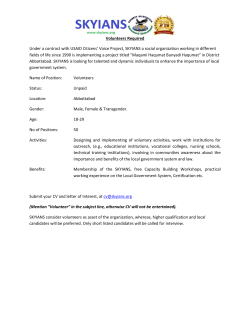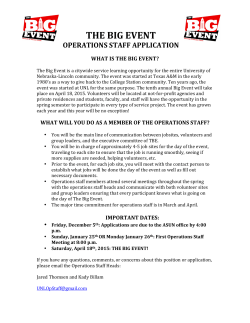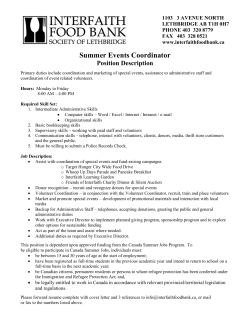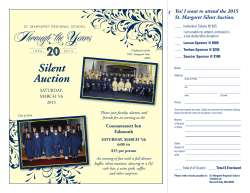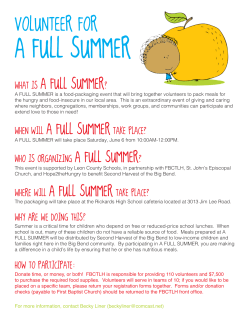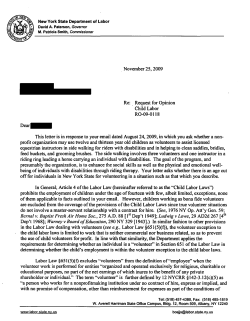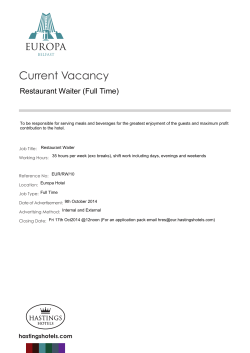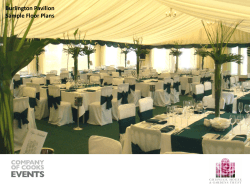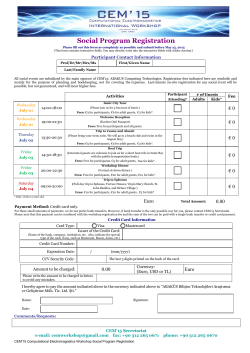
Event planning is a skill that takes time, often many... both mental and physical energy; and diligent practice, even in... Event Planning 101
Event Planning 101 Event planning is a skill that takes time, often many months or years; consistent effort, including both mental and physical energy; and diligent practice, even in the face of tough challenges, to develop and master. So what are the basic steps in planning and implementing a successful event? The following tips offer practical hints and serve as a guide in event planning basics. Components of Event Planning: Planning, Implementation, and Evaluation Event planning can be broken into three phases: planning, implementation, and evaluation. Each phase has specific tasks and action steps, each requires careful planning, and each is integral in pulling off a successful event. I. Planning A. Setting Goals: What do I want to accomplish? 1. A goal is a specific, intended result of a strategy; a desired outcome. 2. Goals have a greater chance of being achieved if they are SMART: i. Specific ii. Measurable iii. Attainable iv. Realistic v. Timely B. Defining Your Motivation: Why do I want to achieve this goal? 1. Your motivation is the reason, cause, or issue that prompts you to act. 2. Being clear about WHY you are organizing an event will help you stay on track when challenges arise AND help you make decisions during the planning process. 3. Ask yourself: i. What is the purpose of this event? ii. Who am I serving? Who is my audience? iii. How will they benefit through this event? C. Develop a Strategy: How will I achieve my goal(s)? 1. A strategy is a plan or method used to achieve a goal; i.e. the tactics. 2. Ask yourself: i. Who will be involved in the planning process? ii. What activities (e.g. workshops) will help me achieve my goals? iii. Who can I ask for help? With whom can I partner with? iv. Who will make final decisions? v. How do I want to organize the planning process? In committees? Individual point people? vi. How will we all communicate with one another? 3. When collaborating with multiple people or groups, make sure that every party has agreed on the intended goal and strategy. D. Create a Concrete Plan: What steps do I need to take and by when? 1. Decide on when to host your event. Keep in mind: P.O. Box 70764, Oakland, CA 94612-0764 510.302.0550 P 510.302.0551 F www.yscal.org 2 i. Are there other events going on at the same time that might conflict with my event by competing for space or participants? ii. Is the date/time of my event ideal for my target audience? (Finals, holidays, work hours, etc.) iii. Does the event date give me enough time to plan, market the event, and recruit volunteers to help out? iv. Is this a one-time or repeating event? 2. Conduct a needs and resource assessment: i. Space a. Where am I going to have my event? What spaces and locations are available? b. How many people am I expecting? c. What does it cost to reserve/use the space? d. Do I need technological equipment? e. Is there adequate parking/public transportation to the location? Is it wheelchair accessible? f. How do I want to set up the room? Will set-up require any equipment and volunteers? ii. Marketing a. How will I let people know about the event? b. Who would be interested in attending? Am I marketing to a general or specific audience? c. What marketing materials do I need to develop? d. What people/organizations/places/businesses might help me market my event? e. Will there be media/press at the event? f. How much will it cost? iii. Food a. Do I need/want to provide food? Why? b. What are my participants’ food preferences/needs? c. How much money do I have to buy food? d. How much food do I need to order and from whom? Do I need to order from the meeting facility or will they allow me to order from an outside vendor? iv. People a. How will we know who’s coming? Do they need to register? Do we need to track of who attends? b. When will we need to know the guest size/list? c. Do we need to help transport them to the meeting? d. Do we need nametags? Who will make them? e. How will we deal with VIPs; e.g. facilitators, presenters, etc…? f. Do we need to provide any materials/handouts? v. Cost a. How much money do I need to execute the event? b. How will it be paid for? Who will develop a budget? 3 c. Who will keep track of the costs? Who will keep track of receipts? d. Do I need to fundraise? What sources offer money? e. Do I need/want to charge participants for attending? II. Implementation A. Ask yourself: 1. During the Event i. Who is going to help set-up and clean-up? How many people are needed? Do I need to recruit volunteers? ii. How will they and my team know what to do? Do they need to be trained? Who will train them? iii. What tasks need to be done? For example: a. Someone to register participants? b. Someone to pick up the food or ensure it arrives? c. Someone to meet and greet VIPs? d. Someone to take care of audio and video needs? e. Someone to bring and check for supplies and materials? III. Evaluation A. Ask yourself: 1. Before the Event i. What kinds of tools can I use to measure whether or not I met my goal? A survey? An evaluation form? ii. How will I get feedback from my participants? iii. What information do I need to track and communicate to funders, my supervisor, etc? (E.g. # attended, money raised, etc…) iv. How can I make sure that this is done in a timely manner? v. Who is responsible for creating and collecting evaluations? 2. After the Event i. When can I meet with my team to debrief? (do it ASAP) ii. Appreciation: Who do I need to send thank yous to? iii. How do I recognize my volunteers and planning team? iv. What are the results of the evaluation? What went well? What could have gone differently? v. How can I take the lessons learned this time and apply them to the next event? IV. Tips A. Use backwards planning to create a timeline and deadlines. 1. Print out a calendar from now until at least 2 weeks after your event date. 2. Write in your event date. From there, work backwards to determine what tasks (as you established from above) need to be completed by when. Make sure to assign a particular person to each task. B. Set up check-points: Where am I in the planning process and do I need to adjust anything? 4 Useful Hints for Effective Event Planning • Set the Goals and Purpose. Be clear and SMART about your goals and the people this event serves (your guests), and keep these at forefront of your planning. • Visualize It Happening. In your mind, visualize the event happening. What does it look like? Who is there? What are they doing? Now that you’ve envisioned your event, think about what needs to occur in order for your vision to become a reality. • Plan Ahead. Map out your event from planning through to implementation and evaluation on a calendar in a central location where it is visible and readily accessible to you and your team. Create to-do lists to guide necessary action steps and note important deadlines. This mapping will help you visualize what and when things need to happen and the to-do lists will keep you on track to completing important tasks. • Collaborate. Identify and seek partnerships with people or organizations that are working on similar causes and could potentially contribute to your event. • Communicate. Establish and make good use of a clear line of communication between all participants in the event, including your team, partners, vendors, and guests. • Delegate Responsibility. Identify what needs to be done and delegate it to individuals or groups who have the capacity to complete the tasks. Planning and pulling off a successful event is a ton of work, and you may find it less overwhelming if you spread out the work amongst capable people. • Be Flexible and Stay Cool. Anticipate that challenges will arise and expect to make changes. It is natural to plan for everything imaginable and to have something unexpected happen. When this happens, stay cool and calmly work to address it. • Reflect and Evaluate. Following the event, make time to reflect on what happened. It is only when we stop to process what has happened that we really learn. Make note of the lessons learned so that you can apply them to your next event. • Appreciation. Make time to genuinely thank your team, partners, and guests for their time and effort. Remember that without them the event does not happen.
© Copyright 2025
